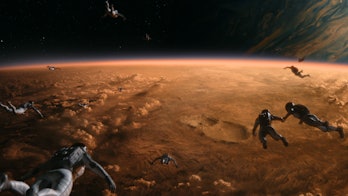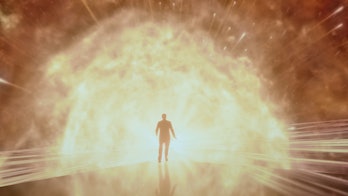A new era of space exploration is upon us. And in the latest series of Cosmos, Neil deGrasse Tyson has a roadmap to help us get there. And it starts with changing how we talk about space.
In the first 60 seconds of the new season of television show Cosmos, which airs Monday evenings on National Geographic, we glimpse what the next millennium may bring. A group of people hold hands as they flock to a new world. On this new Earth, a futuristic city built within the confines of a glass bubble reveals a landscape of green grass and frolicking children.But even as humanity moves forward towards human exploration of Mars, this future still remains very much within the realms of uncertainty.

If we ever hope to make it a reality, first we need to change how we talk about space and science at large. That's show host and astrophysicist Neil deGrasse Tyson's mission statement.
People need to talk about the science "the same way everyone talks about what’s the president doing, what’s Beyoncé doing,” deGrasse Tyson tells Inverse. “I would love for that day to occur.”
“When that day occurs, that would mean that science, and issues that science literacy will inform, have become normalized into everyday discourse,” he says.
“If you can mainstream science, that’s a world that I'm not even necessary in,” he adds.
A NEW HOPE
The focus on the future is a major shift from Cosmos’ first two seasons, which take the audience back in time — around 13.5 billion years ago, to when the universe began.
In an interview with Inverse, deGrasse Tyson explains the choice behind the third season's subtitle, ‘Possible Worlds.’
“There’s an implication that we’re exploring the hope of the future,” deGrasse Tyson says.
“We are exploring what power we might have over shaping the future we might want to live in, and that often requires knowledge and insight, and science and technology," he says, before adding, "and the wisdom to apply it in ways that can best serve those ambitions.”
His words are prescient. Since the first exoplanet was discovered in 1992, missions like NASA’s Kepler and TESS have been on the hunt for more bizarre, alien worlds, with more than 4,000 identified so far. And as more exoplanets are discovered, astronomers are starting to narrow the search for potentially habitable worlds outside of our own Solar System, although any alien life may be quite different to anything that we have ever known.

SCIENCE STORYTELLING ACROSS THE DECADES
Cosmos bridges a gap between science and the general public, using storytelling to guide the
audience through galaxies, exploding stars, and black holes, onboard its signature ‘Ship of Imagination.’Cosmos: Possible Worlds features 13, hour-long episodes. It takes the audience through some memorable space missions, including Cassini and Voyager, and looks ahead to the year 2039 — at New York’s World Fair.
"What I wanted to do was create a vision of the future that was not a kind of fantasy, but informed by science and history," Druyan tells Inverse. "A future that we can still have if we awaken to the challenges that we are facing right now."
Older viewers might remember Sagan's original show, but the new season introduces a younger generation to space science, too. And its main target audience are people who have no interest in science, according to Druyan.
"My mantra is, we are a story driven species," Druyan says. "Our approach has always been, it has to be a compelling story. If it's gonna bore me, it's gonna bore everyone watching too."
The show, which airs at 8:00 p.m. Central on Monday, brings together different generations, deGrasse Tyson says.
"You have two generations of people on the same couch watching the same media, on the same platform at the same time,” deGrasse Tyson says.
The new season of Cosmos was originally delayed for about a year, after deGrasse Tyson faced allegations of sexual misconduct. The network investigated the allegations and eventually dismissed them.

MAKE THEM LAUGH
As a seasoned science communicator, deGrasse Tyson answers all kinds of questions from the public.
One of his favorite questions from people is, “Will we ever visit the Sun?”
He responds by saying, “It might just be best to visit the Sun at night.”
Aside from Cosmos, DeGrasse Tyson hosts a podcast called StarTalk that combines science, comedy, and pop culture by featuring comedians and celebrity co-hosts.
Incorporating humor into science in this way makes it more accessible, he says.
Looking further into the future, deGrasse Tyson says he is encouraged by our space exploration dreams and the possibility of exploring other worlds as humans venture further into space. But some of those future ventures, particularly on the side of the private space industry, are likely oversold, he says.
“I’m excited that they’re excited, somebody’s gotta have that dream,” deGrasse Tyson says.
“But personally, I don’t see private industry going to Mars first. I see governments doing it first and the private industry doing it afterwards.”
Good news for NASA. The agency plans to land humans on Mars at some point in the near future, with a lunar landing scheduled for 2024 that offers the opportunity to test some of the processes that will be necessary to make that dream a reality. It is too soon for NASA to put a date on their ambitions, however. Much will depend on the upcoming manned Artemis missions to the Moon — fingers crossed they go according to plan.

The original series of Cosmos aired in 1980, hosted by beloved astronomer Carl Sagan. A second season of the show aired in 2014 with deGrasse Tyson in the place of Sagan. Writer and producer Ann Druyan was the main driving force behind its reboot. Druyan was also the late Sagan's wife.



No comments:
Post a Comment